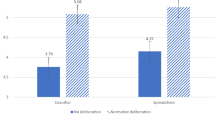Abstract
In this examination of the use of cost-benefit analysis by subjects in the making of ethicality judgments and participation decisions, 318 subjects read one of eight hypothetical descriptions of a study representing four levels of possible subject costs and two levels of possible societal benefits. Six-point, Likert-type scales were used to assess: perceived level of risk; perceived level of benefit; meaningfulness of benefit; cost-benefit balance; participation willingness; and, ethicality of the study. Support for the use of cost-benefit analysis by subjects was found for both participation willingness and ethicality ratings. However, the data indicate that the subjects’ decision making uses a subject-determined, cost-benefit ratio that differs from the experimenter-determined ratio.
Similar content being viewed by others
References
American Psychological Association. (1973).Ethical principles in the conduct of research with human participants. Washington, DC: Author.
Baumrind, D. (1971). Principles of ethical conduct in the treatment of subjects: reaction to the draft report of the Committee of Ethical Standards in Psychological Research.American Psychologist, 26, 887–896.
Berry, K.K., Skinner, L.J., Jackson, T., & Biro, M.T. (1990), June.The ethics of research: subjects’ perceptions of the cost-benefit ratio components. Paper presented at the annual meeting of the American Psychological Society, Dallas.
Berscheid, E., Baron, R.S., Dermer, M., & Libman, M. (1973). Anticipating informed consent: an empirical approach.American psychologist, 28, 913–925.
Brock, T., & Becker, L.A. (1966). “Debriefing” and susceptibility to subsequent experimental manipulations.Journal of Experimental Social Psychology, 2, 314–323.
Collins, F.L., Jr., Kuhn, F., Jr., & King, G.D. (1979). Variables affecting subjects’ ethical ratings of proposed experiments.Psychological Reports, 44, 155–164.
Diener, E., & Crandall, R. (1978).Ethics in social and behavioral research. Chicago: University of Chicago Press.
Drew, C.J., & Hardman, M.L. (1985).Designing and conducting behavior research. New York: Pergamon Press.
Glasgow, D.R., Sadowski, C.J., & Davis, S.F. (1977). The project must count: fostering positive attitudes toward the conduct of research.Bulletin of the Psychonomic Society, 10, 471–474.
Graves, W. (1976).The effects of communication induced sexual arousal on investigation to aggression in a free choice paradigm. Unpublished doctoral dissertation, University of Toledo.
Holmes, D.S. (1967). Amount of experience in experiments as a determinant of performance in later experiments.Journal of Personality and Social Psychology, 7, 403–407.
Kelman, H.C. (1972). The rights of the subject in social research: an analysis in terms of relative power and legitimacy.American Psychologist, 27, 989–1016.
Korchin, S.J., & Cowan, P.A. (1982). Ethical perspectives in clinical research. In P.C. Kendall & J.N. Butcher (Eds.),Handbook of research methods in clinical psychology (pp. 59–94). New York: John Wiley & Sons.
Lynch, D., & Graves, W. (1983). Participants’ perceptions of ethical issues in research with humans.Psychological Reports, 52, 231–238.
Michaels, T.F., & Oetting, E.R. (1979). The informed consent dilemma: an empirical approach.Journal of Social Psychology, 109, 223–230.
Orne, M.T. (1962). On the social psychology of the psychological experiment: with particular reference to demand characteristics and their implications.American Psychologist, 17, 776–783.
Ring, K., Wallston, K., & Corey, M. (1970). Mode of debriefing as a factor affecting subjective reaction to a Milgram-type obedience experiment: an ethical inquiry.Representative Research in Social Psychology, 1, 67–88.
Schlenker, B.R., & Forsyth, D.R. (1977). On the ethics of psychological research.Journal of Experimental Social Psychology, 13, 369–396.
Schuler, H. (1982).Ethical problems in psychological research. New York: Academic Press.
Silverman, I., Shulman, A.D., & Wiesenthal, D.L. (1970). Effects of deceiving and debriefing psychological subjects on performance in later experiments.Journal of Personality and Social Psychology, 14, 203–212.
Straits, C., Wuebben, P.L., & Majka, T.J. (1972). Influences on subjects’ perceptions of experimental research.Sociometry, 35, 499–518.
Stuart, R.B. (1978). Protection of the right to informed consent to participate in research.Behavior Therapy, 9, 73–82.
Sullivan, D.S., & Deiker, T.E. (1973). Subject-experimenter perceptions of ethical issues in human research.American Psychologist, 28, 587–591.
Wilson, D.W., & Donnerstein, E. (1976). Legal and ethical aspects of non-reactive social psychological research.American Psychologist, 31, 765–773.
Author information
Authors and Affiliations
Additional information
The authors appreciate the invaluable work of Deborah Nious and Larry Rudiger during the data collection phase of this study.
Rights and permissions
About this article
Cite this article
Skinner, L.J., Berry, K.K., Biro, M. et al. Research ethicality: The perceptions of participants and their participation willingness. Current Psychology 10, 79–91 (1991). https://doi.org/10.1007/BF02686782
Accepted:
Issue Date:
DOI: https://doi.org/10.1007/BF02686782




